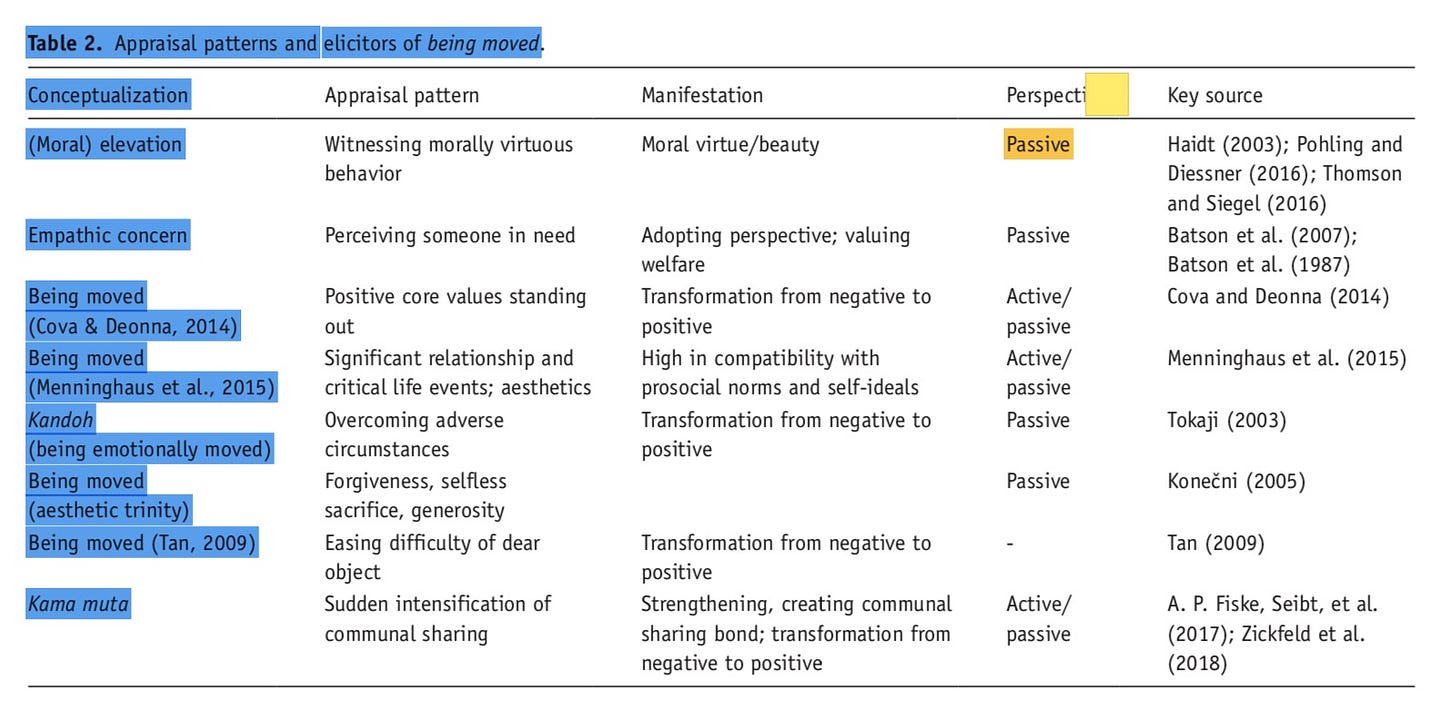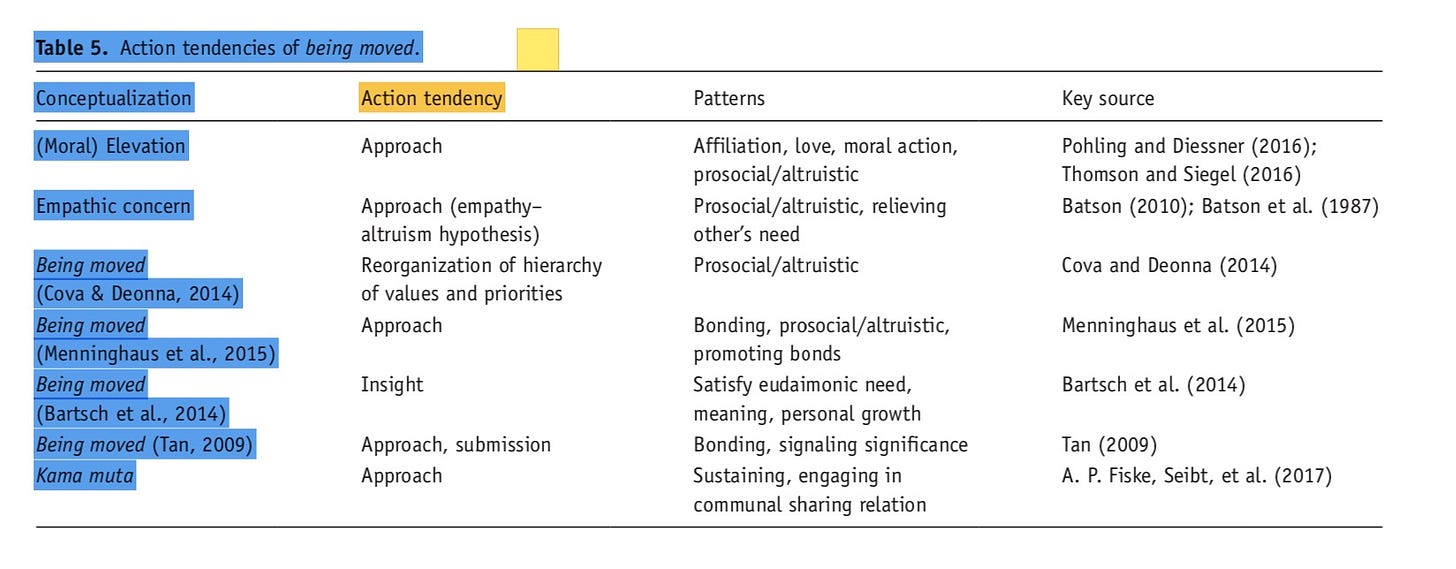Frontiers Friday #96. Emotions (Part II) ⭕

Frontiers Friday #96. Emotions (Part II)
The word Emotion comes from the latin "emovere", which means "to move." Interestingly enough, some researchers are suggesting that "being moved" should be treated as a distinct emotion (see #1).
In case you missed the first part on this topic, here it is:
👓 Read: What Is the Emotion Often Denoted Being Moved?
This article published in Emotion Review (2019) offers a fascinating insight. The researchers from Norway and LA conclude that "being moved" should be treated as a distinct emotion.
Take a look these tables:
Isn't it interesting that based on a body of literature on the topic of "Being Moved" is perceived as a passive experience?
In Chinese, "being moved" gǎn dòng [感动], literally translates “to feel movement."
My Chinese secondary school teacher would be proud of me here. I failed the subject terribly (twice) at my GCE exams. No kidding. I couldn't read 80% of the text, so I did my Mandarin oral exams in English. I talked about B.B. King.
Here's another table from this article:
Another interesting pattern emerged from the body of studies. The lexeme being moved not only fosters approach and prosocial tendencies, but also lead to "insight, meaning and personal growth."
To me, beyond semantics, this has important implications in the practice of psychotherapy:
a. Deep emotional experiencing within-sessions helps to soften the ground;
b. In turn, when the emotional grounds are soften, tapping into one's emotional needs are more likely, and
c. The person is more likely to "be moved" beyond their current state.
When I see or hear emotional responses or visceral changes in the person (e.g., sighs, tears, reporting of chills), I check in, and see if we can takes one more step towards their healing and growth edges. I learned this from watching my supervisor work. It's deeply moving.
👓 Read: Bodily Maps of Emotions
I was introduced to this PNAS article by Les Greenberg during an emotion-focused therapy workshop.
I'm a little skeptical if this is universal across cultures (even though there is a recent study that claimed it is), as well as across individuals (For example, a composite brain scan of hundreds of individuals doesn't necessarily mean that each person's neuro-activation is exactly like the aggregated brain imaging).
Still, it's interesting. Emotions are not just in the mind. It is a real bodily experience. (I talked about this briefly in my other blog, Full Circles: The Music of Emotions and Why We Should Listen).
📜 From My Desk (Archive): Anaesthetic vs. Aesthetic Experience
1-minute read.
Un-numb yourself with aesthetic experiences.
👓 Read: Emotion in Schizophrenia
According to the timestamp on this file, I first read this in Oct 2010.
It was a useful not to self at that point in time, as I was working in an inpatient and outpatient psychiatric setting:
Key Grafs:
- People with schizophrenia have difficulties in anticipatory pleasure.
- This makes them seek pleasurable experiences less.
- Yet, as the authors noted, "...In the presence of emotionally pleasant things, such as films, pictures, tastes, or just day-to-day life, people with schizophrenia report experiencing as much pleasure as do people without schizophrenia."
⏸ Words Worth Contemplating:
"What are you unwilling to feel?"
~ Tara Brach
Reflection:
Ask yourself, when I'm conducting therapy, what am I unwilling to feel? As we prepare for the day of clinical practice, can we create some spaciousness to go there with the question? Just a min or two... Make the choice to go there with fierce kindness and curiosity might open doors of possibilities as you work with others dealing with painful emotions. ...In turn, creating a spacious invitation for clients to speak the unspokens. Allow yourself to be altered, to be moved.
BIG HUGS TO NEW PEOPLE WHO ARE AT THEIR FRONTIER!
If you've just joined us, I'm glad you can join us at the "bleeding edge." Feel free to check out the back catalogue of Frontiers of Psychotherapists Development (FPD). You might also want to go into specific topics in the FPD Archives like
And if you want to see past newsletters, click here.
In case you missed it, see the most recent missives
(3 Parts)
(3 Parts)
(4 Parts)
Unintended Consequences (2 Parts)
(4 Parts)
(6 Parts)
(4 Parts)
(3 Parts)
(5 Parts)
(6 Parts)
(2 Parts)
(4 Parts)
(4 Parts)
(4 Parts)
My other blog site is called FullCircles: Reflections on Living
By the way, don't feel bad if you want to unsubscribe to this newsletter. This might not be for you. The last thing I want is to add to the anxious clutter of our inboxes.



